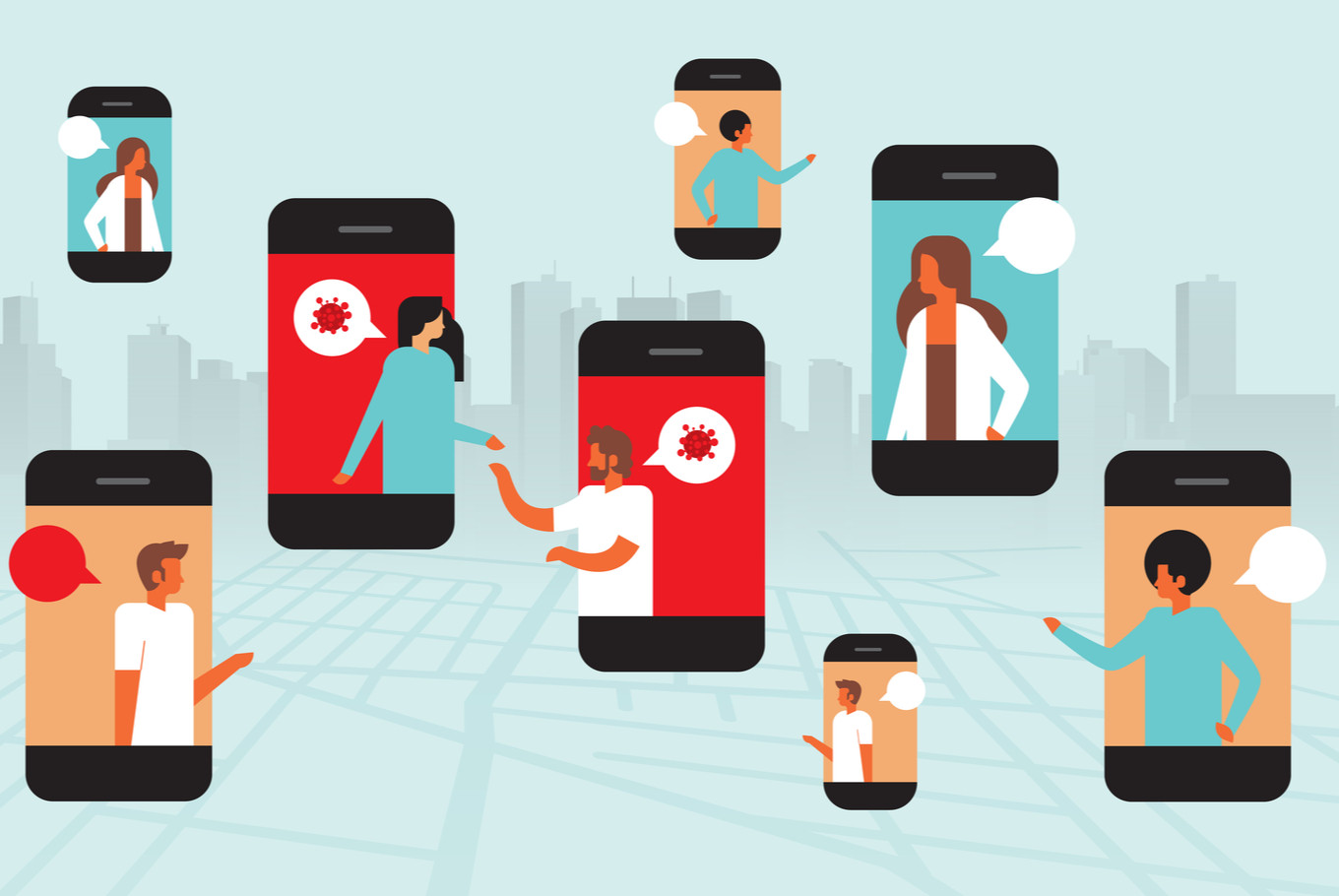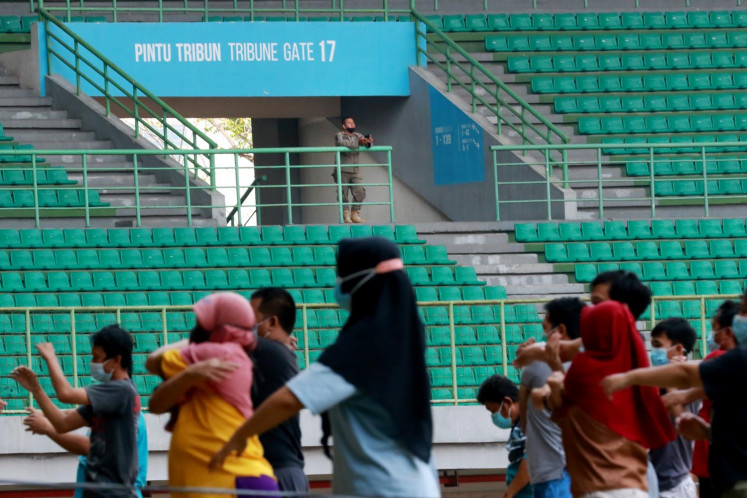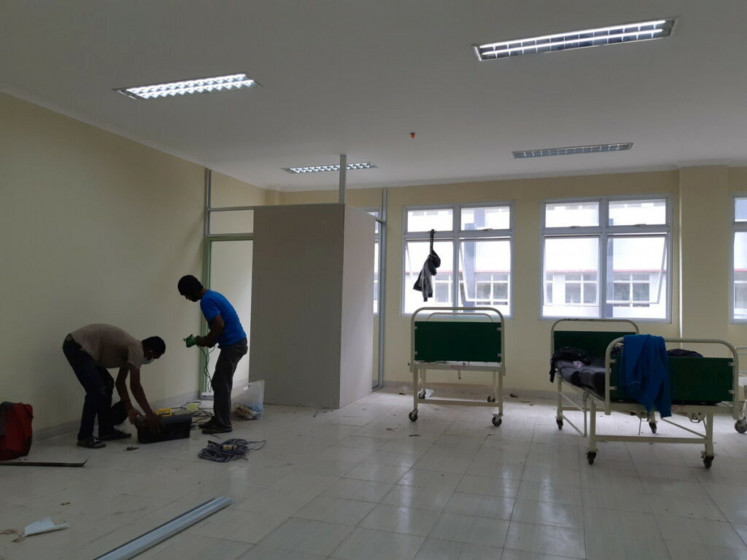Popular Reads
Top Results
Can't find what you're looking for?
View all search resultsPopular Reads
Top Results
Can't find what you're looking for?
View all search resultsHere’s what you need to do if you test positive for COVID-19
If you do catch COVID-19, don't panic. Just remember to report yourself to the local administrator, chose the best option of quarantine, trace your steps back and notify people you've recently met.
Change text size
Gift Premium Articles
to Anyone
Just as it takes a village to raise a child, it takes a whole nation to curb the transmission of COVID-19, an infectious flu-like disease for which doctors have yet to find a cure.
Ensuring that people avoid infection is no doubt important, as the state’s public communications drive may indicate.
But it is just as crucial to let people know what to do to limit further transmission if one is infected, especially when faced with a healthcare system on the brink of collapse.
As the true scale of the health crisis remains obfuscated, The Jakarta Post has compiled a list of things to do for people who have tested positive for COVID-19, so that they can protect not only themselves and their loved ones, but also the communities around them.
Report to Puskesmas, local community leaders
Once someone tests positive for the disease, one of the very first things they need to do is report their status to the local community leaders, which in most cases are the heads of the neighborhood unit (RT) and community unit (RW). They also need to report to the community health center (Puskesmas) closest to their place of residence.
Other than for purposes of data collection, local officials are expected to assist people testing positive with options to self-isolate and the means to monitor their condition.
The latest COVID-19 handling and prevention guidelines published by the Health Ministry even stipulate that officials at the neighborhood and community levels are to help provide meals and logistical support for people undergoing self-quarantine or isolation where necessary.
Read also: Local wisdom plays role in disciplining Indonesians during pandemic
Think through your self-isolation options
Whether to opt for self-isolation at home or quarantine at a hospital or government-run facility, people who have tested positive for COVID-19 – hereafter called confirmed cases – may have to consider their symptoms and their living conditions.
People without symptoms – called asymptomatic cases – and those with moderate symptoms are likely to be advised to self-isolate, but even then, local Puskesmas workers and community leaders must first ensure there is enough means to do so.
In its guidelines, the ministry sets out requirements for people to self-isolate at home, one being that the place must have good ventilation and allow for the restricted mobility of people, with shared rooms kept to a minimum. Even if people in a shared household must share rooms, they have to keep a distance of 1 meter from each other and sleep in different beds.
Confirmed cases must wear a mask around other family members and have separate cutlery that must be washed with dishwashing liquid and warm water after use, according to the protocols. Toilet surfaces must also be routinely cleaned, and the clothes, bed sheets, towels and masks of a confirmed case must be cleaned with gloves and dipped in 60-90 degrees-Celsius water. Others are to avoid contact with any of the contaminated goods.
Self-quarantine in official facilities
Failure to follow these rules at home has been blamed for the emergence of household clusters, prompting the central government and local administrations to provide self-isolation facilities for asymptomatic and moderately symptomatic cases.
To secure a bed at a COVID-19 referral hospital or other quarantine facility, the health ministry has advised asymptomatic and moderately symptomatic cases to seek a referral from their local Puskesmas, which would then decide whether to put the patient at a quarantine facility or a hospital. People with severe symptoms can go straight to a referral hospital.
All confirmed cases looking to self-quarantine outside the home must carefully consider their means of transportation. Pick-up services are often provided by the authorities upon prior notice or request.
There have been calls for the government to publicly disclose data on bed availability at referral hospitals so that people would not have to waste time looking for places to take them in. It would also allow for prompt responses, especially when beds are filling up.
Some provinces have already taken the initiative to inform the public. Makhyan Jibril Al Farabi, an official at East Java's COVID-19 task-force, said that the province had created a WhatsApp Call Center for patients who want to self-quarantine at Lapangan Indrapura, an makeshift hospital in Surabaya for asymptomatic or moderately symptomatic cases.
"As of September, all data is consolidated within the RS Online system [...] Because the ministry doesn't publicly disclose it, we provide a call center that can help people track down available beds," he said. People can reach out to East Java's call center, dubbed the COVIDhub, at +628118140130.
Read also: COVID-19: Here's how to receive treatment at Jakarta’s makeshift hospital
Inform close contacts, contribute to tracing efforts
Confirmed cases are subject to contact tracing by local health agencies and Puskesmas workers, but experts have voiced their concerns over Indonesia's poor performance in tracing.
Close contacts are defined as people who have a contact history with confirmed or probable cases and people who have had any face-to-face interaction with confirmed cases for at least 15 minutes or any contact within 1 m distance.
Epidemiologist Laura Navika Yamani from Airlangga University said that tracing efforts might not cover all patients' close contacts, due to insufficient human resources and the underlying stigma of the COVID-19 labeling, which has resulted in tracers only reaching out to family members or an average of five people, instead of going for the ideal number of 30 traceable contacts.
Laura suggested that confirmed cases should inform others they had been in close contact with within two weeks to let them know they may have to self-quarantine or get tested. She believes all close contacts must be tested right away, even if they are asymptomatic or pre-symptomatic, so they could be “isolated as soon as possible” and don’t become further sources of transmission during COVID-19’s two to 14-day period of incubation.
She urged people to comply with contact tracing efforts. Fortunately, this can be done through a simple phone interview.
The ministry's guidelines say that contacts who must be identified are people that the patients had come in contact with two days before and up to 14 days after they started showing symptoms.
To be deemed adequate, the guidelines stipulate that more than 80 percent of cases should have their contacts traced and quarantined within 72 hours after patients are made aware of their positive test results.
Understand quarantine treatments and duration
The government has promised to bear all costs for patients self-isolating at COVID-19 referral hospitals and quarantine facilities. Those self-isolating at home, meanwhile, must be monitored daily by Puskesmas workers, either by phone or regular home visits.
Read also: Indonesia's latest official COVID-19 figures
Once at a facility, patients are commonly prescribed medication in accordance with their symptoms. There has yet to be an antiviral drug for COVID-19, but existing medication for other diseases may be used for treatment under emergency use authorization.
"Antiviral drugs are used on patients with symptoms; the use of drugs is adjusted to the severity of their illness," pulmonologist Erlina Burhan said recently.
The latest protocol stipulates that asymptomatic cases can complete self-isolation without taking a follow-up polymerase chain reaction (PCR) test after 10 days of self-quarantine, from the day they took the diagnostic test.
Mildly and moderately symptomatic cases must self-quarantine for 10 days after the symptoms’ onset and an additional of at least three days after they no longer have symptoms of fever or respiratory disorder without retesting. Experts say this has increased the public's demand for private testing.
Understand why self-isolating is important
Experts have criticized the government for failing to provide assistance for confirmed cases who self-isolate, which they insist is key to ensuring people’s compliance with containment efforts.
In Indonesia, where many livelihoods depend on the informal sector and daily wage jobs, self-isolation is a luxury that some people might not be able to afford.
The fear of losing one’s job or income, coupled with the stigma associated with COVID-19, has often been blamed for people’s unwillingness to participate in containment efforts, such as getting tested or self-isolating, and makes the act of reporting oneself to authorities that much harder.
There have been cases in which the local communities themselves were at fault for stigmatizing confirmed cases, as several groups reported. A survey by the LaporCOVID-19 community from August has found that from 181 respondents who have caught or have been suspected to have caught COVID-19, some 4.4 percent did not receive assistance and a further 3.31 percent were expelled from their homes.
Fortunately, there have been many more stories of neighbors helping each other out and grassroots efforts filling in the large gaps left by the authorities.












